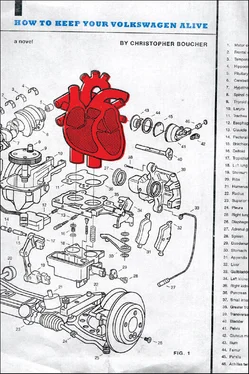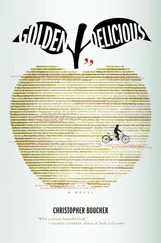FREQUENTLY CRASHING QUESTIONS
I have trouble shifting my VW. Am I doing something wrong?
Probably not. Shifting a VW is more difficult than shifting other cars; VeggieCars allow you to shift a stalk from one seed-cluster to another, but to shift a Volkswagen you must select from twenty-five different gears spread out over five different transmissions. It simply takes money to get used to that system, and to immediately know when to use which speed.
Often, though, it’s an issue of common sense. Clearly I used a faster speed — gear 4/3 (transmission four, gear three), say — for an excerpt from the manual, a lower gear for “One More Night,” a higher gear for “A Scanner Darkly.” I’d use a 3/1 on Route 9, a 3/5 on Route 47, a 1/4 downtown. If I switched to too low a gear — a 1/5 on 47, say — the Volkswagen would stall.
This all might be fiction, though, because usually the VW shifts for you. It’s only if he fails to do so that you have to grab the page and shift it into gear.
It’s a good question nevertheless, because effective shifting can increase the life of your Volkswagen Beetle. Poor shifting, meanwhile, can cut his or her life in half.
What if the Volkswagen stalls?
Don’t give up! Mine used to stall all the time. If that happens with yours, close it and let it cool down. Then stand behind it and give it a push. Sometimes it’s just parked on a bad phrase, and if you push it you’ll ease it onto the next one and it’ll start right up. Then start the car and rev it. Hopefully, forward motion will be restored.
If that doesn’t work, though, there may be a more serious problem — the first phrase may be completely dead, for example, or one of the morning cables attached to the scene clutch may be clogged or stuck. For more information about this, check “Engine Stops or Won’t Start” (Chapter Seven).
How can I tell if my book is still alive?
That’s an easy one: Check its pulse! There is a beat on every page, so you must look through the sentences until you see it. Then put your finger on it and make sure that it’s regular. You might also check under the VW’s voice box, on the inside of his right front wheel, on the underside of his front storage compartment or under the driver’s seat. Press your finger against the sentence. You should feel an unmistakable rhythm, a contagious waltz.
My Volkswagen is asking to go to driving school. Should I let her?
No — not to driving school or any school, in my opinion. It’s just not necessary. My son attended the Jackson Street School in Northampton for a few months when he was a child, but he’d come home each day talking about unfamiliar eeps — mass no’s and time-as-turning. When he told me about them I’d say, “Didn’t they teach you anything about traffic? The rules of the road?”
The VW would shake his head and say something like, “Today we learned about the Holocaust.”
I say, your VW already has everything he needs. All he has to do is go from here to there , and that’s something you can teach him.
What if the story gets dark?
This does happen from time to time — light leaves the car, the book, and the roads of western Massachusetts — and no one is exactly sure why. Luckily, the Volkswagen is born with luminescent eyes that light up in accord with a) his spiritual mode, b) the position of the switch to the left of the page.
One theory on this is that Volkswagens not only emit light from their eyes, but actually broadcast everything in front of them — the entire page/scene. This sounds treble, I know, but I’ve received letters from several severances who believe that the act of reading is actually a trip through the Volkswagen’s mind as sent out through his eyes.
Whose story do you think this is?
A fair question. At the center of this all, we will discover, is the question of control. Hampshire and Franklin County will present themselves, will ask us — you, me — to change. We will have to make decisions. It will be important to know who is steering the car — you, or the VW?
The answer to that question depends very much on the situation, on where we are in the story. There are moments here where the VW is just a margin, hardly tested. Sometimes he will turn his own pages, other times he can’t. In these cases, it’s your job to take the wheel in your hands and steer the car yourself.
In many cases, you and the Volkswagen will share the job. And that’s the way it should be, it seems to me. I like the idea that driving the Volkswagen is an act of cooperation — you and I working together, each of us befriending our Volkswagen and learning how to help him or her. Because in many ways, we’re all the same — the Volkswagen is a machine that digests information and responds to it, and so are you. Plus we’re all trying to reach the same thing (the end/home)!
It would be easy and foolish, though, to forget to make room for others’ needs as well. Remember that we’ll be sharing the road with pedestrians, opinionated signs and other drivers. There may very well be moments in these stories, then, when the VW wants to go one way and you want to go another, or when you’ve simply had enough and you want to go —to speed, to flee — but must stop in the name of safety and community.
For me, that’s what made parenting the Volkswagen interesting and fun. I was never alone when he was alive. I was sharing in something that was larger than myself, and so are you: By stepping into the VW, turning the key and moving into traffic, you are part of a tradition, a family that spans across place and name, deep into the past and fast forward into tomorrow.
* VeggieCars were vehicles made out of genetically-engineered tomatoes, peppers, cucumbers or eggplants, grown six or seven feet high, with natural engines made of seeds. They ran well and were fueled by the rain and the sun. Their only drawback was that they lasted for just six months, no matter how well-treated or preserved. Then their doors wouldn’t close, and the tires started to get soft and lumpy, and the roof turned brown, and you had to say goodbye to your VeggieCar and pay a CarFarmer to go out into his or her field of cars and pick you out another one.
SHIMMIES AND SHAKES
That was back in the fall when everything fell — when the VW’s mother, the Lady from the Land of the Beans, left us for the homefarm; when my son began to ask questions I didn’t know the answers to; when the loss of my father began to burn my sidestreets. I fumbled, lost hold: The Volkswagen was no longer a newborn, and he was beginning to have health problems. And the apartments at Crescent Street — the five-unit Victorian that my father had raised and loved and run like a quite? They howled for help — help I tried, and failed, to give.
My father had bought the building, a British-speaking outburn, when I was a student of distance in the late 1990s. The house had been raped and beaten and a group of nomadic ovens had discovered it empty and moved right in. My father went in there with love and kindness and tried to heal the house, but the ovens wouldn’t leave. My Dad had to appeal to the city to resolve it. I was there at those meetings, with the ovens in their headbands and dirty dresses — I remember them weeping, my father promising, Northampton extending her hand. My Dad was awarded the right to parent the house, and he did exactly what he promised the City he would; he gave all his time, every minute he could pledge or owe, to convincing the dizzy home back to grace, and went so far as to move the ovens into a small house at the edge of the property.
Читать дальше












